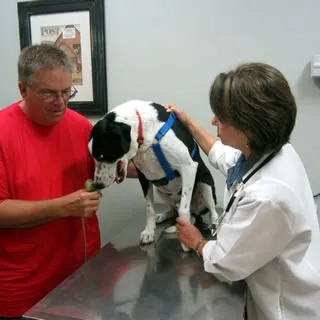Heartworm disease is a serious and potentially fatal condition affecting pets in the United States and worldwide. Understanding the symptoms of heartworm in dogs is crucial for early detection and treatment. This guide will provide a comprehensive overview of heartworm disease, its transmission, symptoms, and what to do if your dog tests positive.
What is Heartworm Disease?
Heartworm disease is caused by foot-long worms (heartworms) that reside in the heart, lungs, and associated blood vessels of infected animals. These parasites lead to severe lung disease, heart failure, and damage to other organs. While it primarily affects dogs, cats, and ferrets, heartworms can also infect other mammals like wolves, coyotes, and, rarely, even humans.
Dogs are natural hosts for heartworms, meaning the worms can mature, mate, and produce offspring within them. Untreated dogs can harbor hundreds of worms. This infection causes lasting damage to the heart, lungs, and arteries, affecting the dog’s health and quality of life long after the parasites are gone. Prevention and early treatment are essential.
How is Heartworm Disease Transmitted?
Mosquitoes play a critical role in the heartworm life cycle. Female heartworms living in an infected dog, fox, or coyote produce microscopic baby worms called microfilariae, circulating in the bloodstream.
 Heartworm Life Cycle in Mosquito
Heartworm Life Cycle in Mosquito
When a mosquito bites an infected animal, it picks up these microfilariae. Over 10 to 14 days, these develop into “infective stage” larvae within the mosquito. When the infected mosquito bites another susceptible animal, these larvae are deposited on the skin and enter the new host through the bite wound. It takes about 6 months for these larvae to mature into adult heartworms within the new host. Mature heartworms can live for 5 to 7 years in dogs.
What Are The Signs of Heartworm Disease in Dogs?
In the early stages, many dogs show few or no symptoms. However, as the infection progresses, symptoms become more apparent. Active dogs, heavily infected dogs, or those with other health issues often exhibit more pronounced clinical signs. Understanding these symptoms is key to protecting your pet.
Common signs of heartworm disease include:
- Mild Persistent Cough: A dry cough that doesn’t go away easily.
- Reluctance to Exercise: Your dog may seem less enthusiastic about physical activity.
- Fatigue After Moderate Activity: Getting tired more quickly than usual after exercise.
- Decreased Appetite: Loss of interest in food.
- Weight Loss: Unexplained reduction in body weight.
As the disease advances, more severe symptoms may develop:
- Heart Failure: Difficulty breathing and overall weakness.
- Swollen Belly: Excess fluid accumulation in the abdomen.
In severe cases, dogs can develop caval syndrome, a life-threatening condition caused by a sudden blockage of blood flow within the heart. Signs of caval syndrome include:
- Labored Breathing: Difficulty in breathing.
- Pale Gums: Gums appear lighter than normal.
- Dark Bloody or Coffee-Colored Urine: Changes in urine color.
Without prompt surgical removal of the heartworm blockage, few dogs survive caval syndrome.
How Significant is My Dog’s Risk for Heartworm Infection?
Many factors influence your dog’s risk, regardless of whether heartworms are prevalent in your area. Heartworm disease has been diagnosed in all 50 states, and risk factors can be unpredictable. Climate variations, the presence of wildlife carriers, and even infected mosquitoes that come indoors can all contribute to the spread of the disease.
 Heartworm Incidence Map
Heartworm Incidence Map
The American Heartworm Society recommends:
- Getting your pet tested every 12 months for heartworm.
- Administering heartworm preventive medication 12 months a year.
What Do I Need to Know About Heartworm Testing?
Early detection is crucial for a better recovery chance. Since there are often few early signs, regular testing is vital. A veterinarian administers a heartworm test using a small blood sample to detect heartworm proteins. Results are usually available quickly, and further tests may be required if the result is positive.
When Should My Dog Be Tested?
Testing schedules differ slightly between puppies and adult dogs.
Dogs:
- Puppies under 7 months old can start heartworm prevention without a test, but should be tested 6 months after the initial visit, then again 6 months later, and annually thereafter.
- Adult dogs over 7 months old not previously on prevention need testing before starting prevention, followed by tests 6 months and 12 months later, and then annually.
- If there’s a lapse in prevention, test immediately, then again six months later, and annually.
Annual testing ensures the prevention program is effective.
What Happens If My Dog Tests Positive for Heartworms?
Most infected dogs can be successfully treated. The goal is to stabilize the dog and eliminate all worms while minimizing side effects.
Here’s what to expect:
- Confirm the Diagnosis: A positive antigen test should be confirmed with another test.
- Restrict Exercise: Physical exertion increases heart and lung damage.
- Stabilize Your Dog: Stabilize the dog’s condition with appropriate therapy before starting heartworm treatment.
- Administer Treatment: Follow a veterinarian-recommended protocol, often guided by American Heartworm Society guidelines.
- Test for Success: Re-test about 6 months after treatment to confirm elimination of heartworms.
 Dog in Cage
Dog in Cage
To prevent reinfection, administer heartworm prevention year-round.
How Do Monthly Heartworm Preventives Work?
Whether administered as a pill, topical medication, or injection, heartworm preventives eliminate immature (larval) stages of the parasite. These medications must be given strictly on schedule, as immature larvae can develop into an adult stage in as little as 51 days, which preventives cannot effectively eliminate.
When Do I Start My Dog on Heartworm Prevention?
Start puppies on heartworm prevention as early as the product label allows, no later than 8 weeks of age. Dosage is based on body weight, not age.
Do I Need a Prescription for My Pet’s Heartworm Preventive Medication?
Yes. FDA labeling requires a licensed veterinarian’s order. Veterinarians typically perform a heartworm test before prescribing preventives.
 Veterinarian Examining Dog
Veterinarian Examining Dog
Is There an Effective Natural Prevention for Heartworm?
No. Only FDA-tested and proven products should be used.
Is There a Vaccine for Heartworm Disease?
No. Prevention relies on regular use of preventive medications prescribed by a veterinarian.
Are Heartworms More Common in Certain Areas of the United States?
Yes. Higher-risk areas include Atlantic and Gulf coasts, and river tributaries. Risk depends on climate, mosquito species, breeding areas, and animal reservoirs.
I Live in a Northern State. How Long Should My Dog Be on Heartworm Prevention?
The American Heartworm Society recommends year-round prevention, even in colder regions, as mosquito species adapt, and many products also deworm for intestinal parasites.
What Causes a Dog to Die from Heartworm Disease?
Heartworm disease affects vital organs, causing inflammation, blocked blood flow, pulmonary thrombosis, heart failure, and potential liver or kidney failure.
 Dog Heartworms
Dog Heartworms
The Expiration Date on My Pet’s Heartworm Medication is Past. Can I Still Use the Medication?
No. Use heartworm preventives before the expiration date to ensure effectiveness and safety.
I Have Missed 2 Months of Heartworm Prevention for My Dog. What Should I Do?
Consult your veterinarian, restart monthly preventive immediately, and retest your dog 6 months later.
